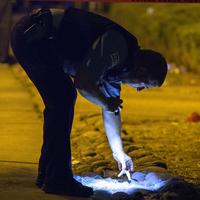Study: Violent Crime And Murders Slightly On The Rise This Year In Largest Citie
ROBERT SIEGEL, HOST:
Murders and other violent crimes are up slightly this year, but a new analysis shows that just a few cities are responsible for most of that increase. NPR justice correspondent Carrie Johnson reports.
CARRIE JOHNSON, BYLINE: Crime data from the nation's 30 largest cities suggests homicides are up 13 percent this year over last, but the new study from the Brennan Center for Justice says only a few hotspots are to blame. INIMAI CHETTIAR: There was an increase in murders in the U.S., and that was driven by Chicago alone.
JOHNSON: Inimai Chettiar directs the Justice Program at Brennan. Researchers there say murders are also rising this year in Dallas and Oklahoma City. But they're lower in Baltimore and Washington, D.C. Both of those places suffered big homicide spikes in 2015. Overall Chettiar says crime remains near record lows.
CHETTIAR: So it's definitely too early to tell what's happening in these cities and whether this is something that is a long-term trend we should be concerned about or whether this is just normal year-to-year fluctuation. JOHNSON: Crime and punishment have been coming up a lot in this year's presidential campaign, for Hillary Clinton, the problem is mostly one of weapons winding up in the hands of people who shouldn't have them. Here she is talking at the Democratic National Convention this year.
(SOUNDBITE OF ARCHIVED RECORDING)
HILLARY CLINTON: We will work tirelessly with responsible gun owners to pass common sense reforms and keep guns out of the hands of criminals, terrorists and all others who would do us harm.
JOHNSON: Clinton says violent crime has dropped substantially since its peak 25 years ago. She credits years of hard work by police and community leaders. But her political opponent Donald Trump has been taking a darker view. He made violence a theme of his speech at the Republican National Convention.
(SOUNDBITE OF ARCHIVED RECORDING)
DONALD TRUMP: Decades of progress made in bringing down crime are now being reversed by this administration's rollback of criminal enforcement. JOHNSON: Trump cast himself as a leader who will restore law and order, but the federal government has little power over most street crimes. John Pfaff is a law professor at Fordham University.
JOHN PFAFF: There's actually very little that the president can do about crime. It's mostly controlled by policing. That's controlled by city governments and by prisons that are controlled by state governments. And the feds have a very hard time changing either of those two policies.
JOHNSON: Even so, this probably isn't the last time the presidential candidates will use crime data as a political wedge. The FBI plans to release its latest nationwide crime report September 26, the morning of the first presidential debate. Carrie Johnson, NPR News, Washington.

